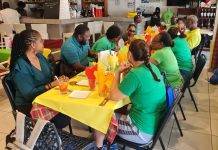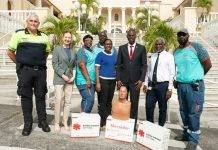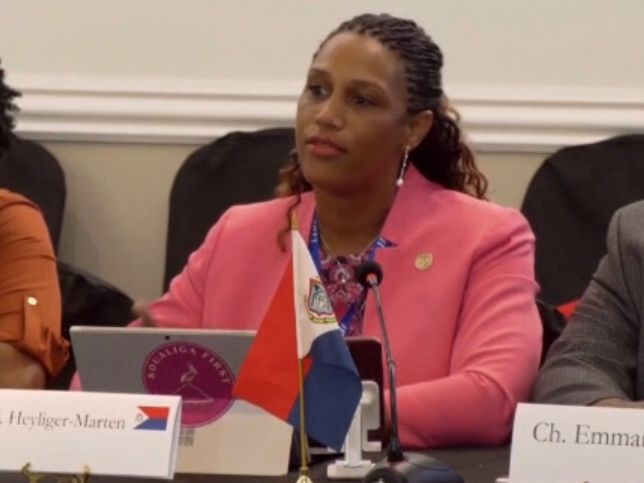PHILIPSBURG, Sint Maarten — In a comprehensive and detailed letter to the Prime Minister, the Hon. Silveria S. Jacobs, on Monday, MP Grisha Heyliger-Marten proposed an urgent vetting of all current legislation within the Kingdom related to the Caribbean islands, including the Kingdom Charter (“het Statuut”), against the peremptory (“jus cogens”) norm of international law with regards to self-determination and decolonization, and in particular the UN Charter and all related UN resolutions.
In her letter to the Prime Minister, Heyliger-Marten also requests a letter that Parliament received from Pro Soualiga Foundation dated October 10th, 2022 to be forwarded to the Dutch and Kingdom Councils of Ministers for a response. In the letter, Pro Soualiga responds to legal questions asked by Heyliger-Marten on September 13th, 2022 regarding finalizing the decolonization, reparations, and the rights to self-determination.
“During the budget debate and other exchanges with Government, the Ministers regularly point out to Parliament that their policies, actions, and decisions need to be in full compliance with international laws. And of course I couldn’t agree more. But we shouldn’t pick and choose what we vet. If we vet certain laws on compliance with international law, why not all laws within the Kingdom?”, Heyliger-Marten stated in a press release on Monday afternoon.
In her letter to the Prime Minister, the MP specifically referred to the vetting of the Kingdom Charter (het “Statuut”), and the recently agreed upon mutual arrangements between the Netherlands and Aruba, Curaçao, and St. Martin.
“With all the developments and particularly the conflicts going on within the Kingdom the past years, it is high time that we start looking at the foundation of any society, including the Kingdom. And that is the legal basis and rule of law”, Heyliger-Marten said.
“We all expect and demand that citizens respect the law. We rightfully punish them if they don’t, and by doing so make others suffer from their actions. But what if we ourselves as Parliament and Government don’t abide by international law, and because of that make the same people who we represent suffer the consequences?”, the MP asked rhetorically.
“And what’s even worse, what if we allow the Dutch and Kingdom Governments to violate the rights of St. Martin and its people by forcing us to deprive them of money, food, education, healthcare, and prosperity. From what this Government has told Parliament since the COHO law was proposed in 2020, this is exactly what has been going on, and it needs to stop.”
According to Heyliger-Marten, if the Government is serious about its pledge in the Governing Program to resolve the “over-arching issue of full decolonization of Sint Maarten under international law”, all Kingdom laws need to be vetted against that same international law.
In her letter to Jacobs, Heyliger-Marten suggests that the “Advisory Committee on International Law Issues” (CAVV) is requested to carry out the vetting process. According to Heyliger-Marten, the CAVV is an independent advisory body, and advises the Dutch Government and the Senate and House of Representatives on issues of international law.
“In light of the upcoming Kingdom conference, and the ongoing discussions about slavery reparations and atonement and debt cancellation, it is important to use international law as the basis for providing for our people. We need to know what our rights our under international law before entering into any new agreements. And the current agreements should be reviewed closely”, according to Heyliger-Marten.
Her letter to the Prime Minister was also copied to the other Parliaments and Governments within the Kingdom, with State Secretary van Huffelen and Permanent Committee for Kingdom Relations MP Mariëlle Paul receiving a specific accompanying cover letter requesting them to respond to Heyliger-Marten’s vetting proposal.
“If we as elected and appointed representatives within the Dutch Kingdom truly respect the United Nations and the international legal order and want to uphold it, then certainly none of us can object to having all Kingdom legislation vetted, instead of just those some laws when it’s convenient.
So I truly hope that we can all cooperate in the spirit of the Kingdom, do our homework, and get the vetting process finalized before the Kingdom conference takes place. It’s projected for the end of the year, so time is running out, but I’m still optimistic that we will make it and have a successful Kingdom Conference”, Heyliger-Marten concluded.






























